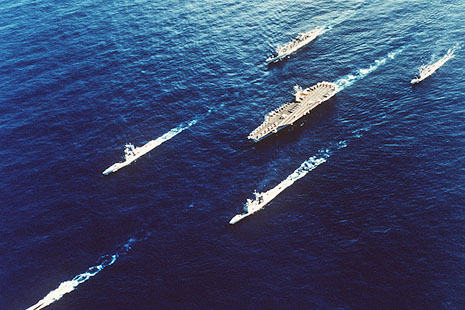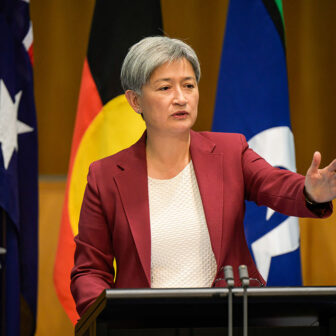A controversial paper by the high-profile think-tank strategist Ross Babbage has revived intense debate in national political, academic and bureaucratic circles about Australian security policy towards China. Babbage, director of the Kokoda Foundation, has argued for hard-line, carrot-and-stick Australian policies, including the purchase of nuclear-powered attack submarines, to discourage any potential attack from China as its economic and military power grows.
Greg Sheridan of the Australian described Babbage’s paper as one of the most important, deeply considered and logically compelling strategic documents ever seen in Australia. In a joint response, Emeritus Professor Paul Dibb and I called it contradictory, panicky and hysterical.
Professor Hugh White, of the Strategic and Defence Studies Centre at the Australian National University, the author of a recent Quarterly Essay on China’s rise, said he agreed with Babbage that Australia was not yet addressing China’s rise effectively, but that he was “a little less pessimistic.”
There has been no government or bureaucratic response so far, but there seems at best only limited official support for Babbage’s views, which reflect his dissatisfaction with the 2009 defence white paper. Defence Minister Stephen Smith and Foreign Affairs Minister Kevin Rudd, who is reportedly close to Babbage, have not commented directly on the issues. But in a recent speech Smith reiterated calls for greater Chinese openness and transparency about its military capabilities and strategic doctrine.
Reflecting an official optimism not shared by other participants in the revived China policy debate Smith said Australia was confident and positive about China’s emerging as a responsible stakeholder and wanting to take part in the regional and international community in accordance with accepted international norms.
Babbage, Dibb and I have now given evidence separately to private sittings of the parliamentary joint standing committee on foreign affairs, defence and trade which is keenly interested in potential security issues flowing from China’s economic and military rise.
In fact, all participants in the current debate are security policy realists who regard China as a brutal Leninist state with an appalling domestic human rights record and an increasing tendency to throw its weight around. Like all rising powers it aspires to challenge established competitors (especially the United States) and to expand its military and diplomatic influence and reach. As a global trading nation China also has legitimate interests in protecting its sea lines of communication and in ensuring its food security and access to minerals and energy resources on which its economy depends.
The fundamental issues are whether the policies advocated by Babbage are practical or desirable or whether the white paper policy prescriptions and rearmament proposals, if implemented, would sufficiently increase Australia’s strategic weight to deter or balance any Chinese threat or pressure. Babbage, an adviser on the white paper panel, does not believe the modernisation proposed in the white paper would be “very effective in balancing the challenge posed by the rapidly rising PLA [People’s Liberation Army].”
In his paper, “Australia’s Strategic Edge in 2030,” Babbage expresses deep and reasonable concerns about China’s growing military power and assertiveness. He also expresses profound pessimism about the economic outlook for the United States over the next decade. He asks what Australia should do to offset and deter Chinese expansion in Australia’s western Pacific approaches.
He proposes what he calls a highly asymmetric counter to China, involving military acquisitions and policies that he says would be seen in Beijing and elsewhere as “game-changers.” In short, he says Australia should acquire ten to twelve American Virginia-class nuclear attack submarines, join with the United States in developing new stealth strike aircraft and possibly an advanced missile system, arm arsenal ships with cruise missiles, and expand cyber warfare and advanced underwater combat capabilities.
At the same time, he says, the United States and its allies should not seek to confront China, but rather to offset and balance its more threatening force developments. Australia should pursue friendly engagement while watching Beijing’s assertive military and intelligence capabilities and operations.
Babbage also says that Australia should make it clear to China’s leadership that it would risk paying “a very heavy price” if the PLA were to threaten serious damage to Australia’s vital interests. He writes of the possibility of Australia’s threatening the cohesion of the Chinese state.
Perhaps most radically, he argues that Australia should develop “a network of personal linkages… with key people in China and other relevant societies who harbour serious economic, social or political grievances against the regime… to develop the capability to stir serious internal disruptions and even revolts in the event that the Chinese leadership threatened Australia’s vital interests.”
In some respects Babbage’s proposals resemble those in the white paper. It proposes that Australia acquire twelve conventional submarines, up to one hundred joint strike fighters, three air warfare destroyers, cruise missiles, expanded cyber warfare and anti-submarine warfare capabilities and other modern weaponry. The proposals are roughly costed, although few observers now think the entire program will prove affordable.
The white paper says that the planned acquisitions would enable the Australian Defence Force to contest hostile military operations in Australia’s primary operational environment and to be able to impose substantial costs on “a major power adversary.”
Babbage’s proposals are not costed, although he estimates the nuclear submarines would cost some $28 billion. He does not explain how Australia (population: twenty-three million) might manage to foment revolts in nuclear-armed China with 1.3 billion people, and why the Chinese leadership might be inclined to submit to the crude threats implied in his paper.
Babbage’s critics point out that China is not in the same league as the former Soviet Union in terms of military strength and infrastructure. They note that China has no experience of modern warfare and has a strategic culture that emphasises defeating enemies without fighting them. They also wonder under what circumstances China would want to attack Australia.
Babbage’s critics also question his apparent fear of China’s economic and military rise, asking whether it will in fact be sustainable and whether its Leninist system can survive in a world in which democratic convulsions have shaken Eastern Europe and the Middle East. They similarly regard his pessimism about the United States as excessive, noting that it remains immensely more powerful and more innovative than China.
Those, like Professor White, who are more sympathetic to Babbage, focus on the possibility that China will continue to rise and produce a more contested western Pacific region over the next twenty or so years. They are also concerned by the trajectory of US–China relations. White argues that the best outcome for Australia would be for the United States to abandon its current strategic primacy and to share collective leadership with China.
It seems unlikely that Babbage will be seen as more than a boundary marker in the ongoing debate over China’s rise and its future intentions. But he and White and the defence white paper have focused attention on the immense security uncertainties produced by China’s growing economic and military power. It is the great foreign and defence policy issue of our generation. How we address it will shape our future prosperity, security and sovereign independence. •




